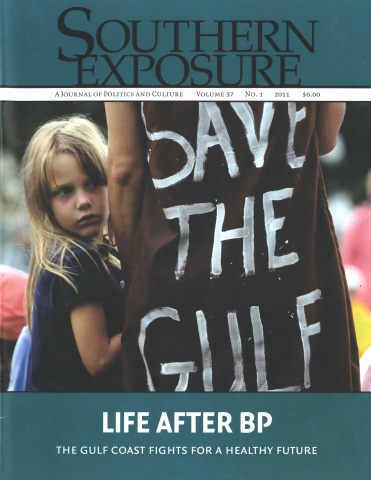Beyond BP: The Gulf Coast Fights for a Healthier Future

This article originally appeared in Southern Exposure Vol. 37 No. 1, "Life After BP." Find more from that issue here.
“Already, this oil spill is the worst environmental disaster America has ever faced. And unlike an earthquake or a hurricane, it’s not a single event that does its damage in a matter of minutes or days. The millions of gallons of oil that have spilled into the Gulf of Mexico are more like an epidemic, one that we will be fighting for months and even years.”
— President Obama, Oval Office Address, June 15, 2010
When the BP Deepwater Horizon rig blew up off the Louisiana coast on April 20, 2010, it triggered what would turn out to be the worst oil spill in U.S. history, with almost 200 million gallons pouring into the Gulf of Mexico before the well was capped three months later.
Oil-covered pelicans and struggling fishing families became common symbols of the BP disaster, and the spill’s devastating consequences on the environment and economy are still reverberating across the Gulf Coast.
Within weeks of the explosion, the Institute for Southern Studies began hearing about another, less-noticed problem developing in the Gulf: widespread reports of severe health problems experienced by cleanup workers and coastal residents. Many attributed them to the gushing crude, as well as smoke from efforts to burn off surface oil and the spraying of unprecedented amounts of chemical dispersants.
With few of these disturbing stories making it into the mainstream media, the Institute launched a project reporting on the disaster’s environmental health implications. We contacted dozens of Gulf Coast community groups and government agencies looking into the spill’s public health hazards.
We took two fact-finding trips to the region, once during the spill in 2010 and again eight months after the well was capped in 2011, to witness the problems for ourselves, speak with BP and government officials, and hear first-hand from Gulf residents affected, from Moss Point, Miss, to Grand Isle, La.
Our investigation found an unmistakable and growing body of evidence that Gulf Coast residents have been experiencing severe health problems in the wake of the BP disaster.
Public health experts say that many of these health problems are what is to be expected after severe chemical exposures. The symptoms are also similar to those suffered by cleanup workers and residents in Alaska after the 1989 Exxon Valdez tanker spill—and by Gulf residents on the receiving end of the massive pollution generated by the Gulf’s oil and gas industry.
But our investigation also finds that BP and officials at all level of government have been slow to confront the evidence of widespread health problems in the Gulf Coast. They claim they are waiting for more research and hard evidence. But advocates blame the power of the Gulf energy lobby, which has spent millions of dollars over the last year to block action and reform.
The result: As the New Orleans Times-Picayune reported one year after the BP disaster, Congress has done “virtually nothing” to address the health and safety issues raised by the Deepwater Horizon spill.
On the one-year anniversary of the Deepwater Horizon explosion, the Institute’s Facing South online magazine (www.southernstudies.org) published a five-part series about the public health concerns triggered by the disaster. We have refined, expanded and updated that series for this edition of Southern Exposure.
The BP disaster is far from over. We hope this investigation helps put the pressing need for full Gulf recovery back on the national radar. We also hope it gives voice to the many Gulf Coast residents struggling for a healthier future for their families and communities.
This investigation was made possible due to support from the Fund for Environmental Journalism, the Fund for Investigative Journalism and the Surdna Foundation, as well as many individual contributors to the Institute Investigative Fund. If you would like to support independent, investigative journalism, please consider making a tax-deductible contribution to the Fund today online at www.southernstudies.org or by mail to ISS, P.O. Box 531, Durham, NC 27702. Thank you!
Tags
Sue Sturgis
Sue is the former editorial director of Facing South and the Institute for Southern Studies.
Chris Kromm
Chris Kromm is executive director of the Institute for Southern Studies and publisher of the Institute's online magazine, Facing South.

